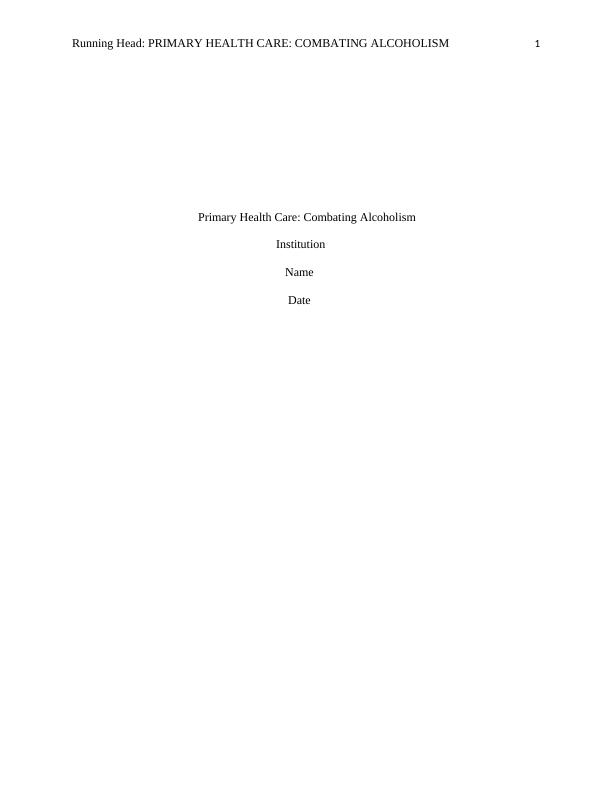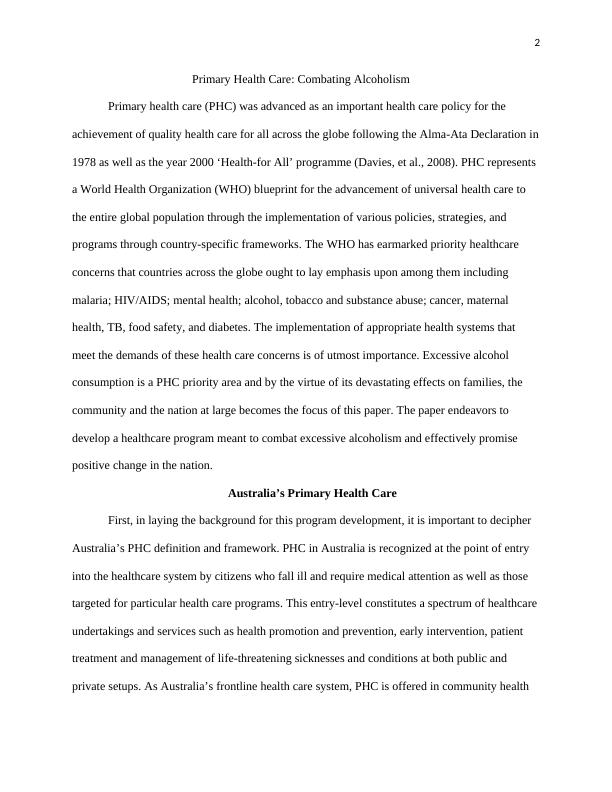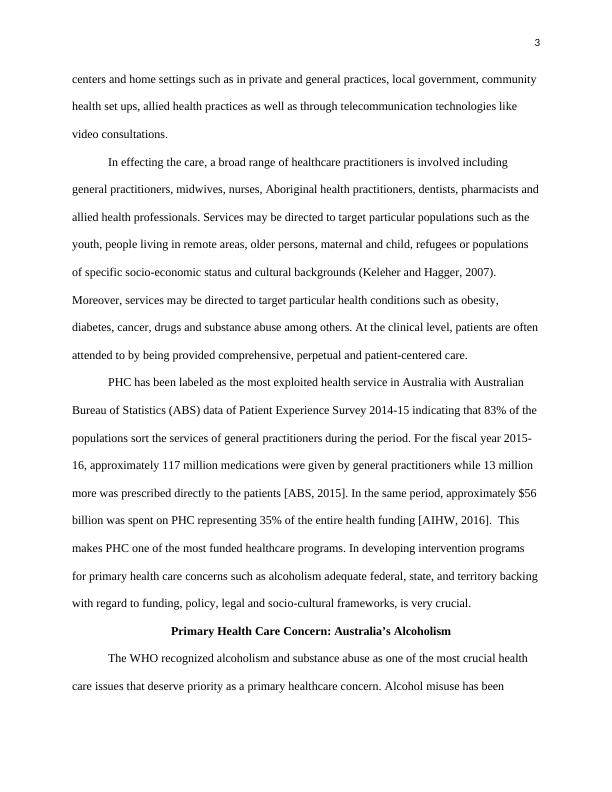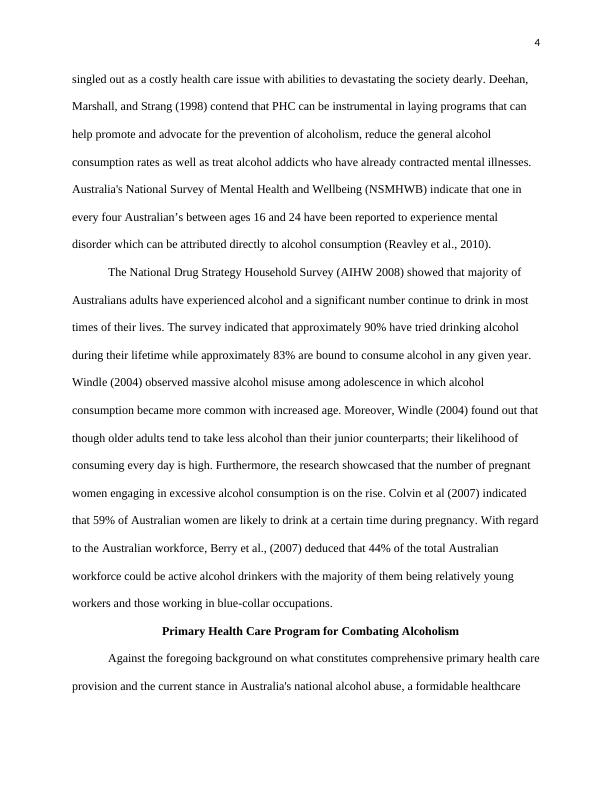Primary Health Care: Combating Alcoholism
Added on 2023-06-12
11 Pages2978 Words362 Views
Running Head: PRIMARY HEALTH CARE: COMBATING ALCOHOLISM 1
Primary Health Care: Combating Alcoholism
Institution
Name
Date
Primary Health Care: Combating Alcoholism
Institution
Name
Date

2
Primary Health Care: Combating Alcoholism
Primary health care (PHC) was advanced as an important health care policy for the
achievement of quality health care for all across the globe following the Alma-Ata Declaration in
1978 as well as the year 2000 ‘Health-for All’ programme (Davies, et al., 2008). PHC represents
a World Health Organization (WHO) blueprint for the advancement of universal health care to
the entire global population through the implementation of various policies, strategies, and
programs through country-specific frameworks. The WHO has earmarked priority healthcare
concerns that countries across the globe ought to lay emphasis upon among them including
malaria; HIV/AIDS; mental health; alcohol, tobacco and substance abuse; cancer, maternal
health, TB, food safety, and diabetes. The implementation of appropriate health systems that
meet the demands of these health care concerns is of utmost importance. Excessive alcohol
consumption is a PHC priority area and by the virtue of its devastating effects on families, the
community and the nation at large becomes the focus of this paper. The paper endeavors to
develop a healthcare program meant to combat excessive alcoholism and effectively promise
positive change in the nation.
Australia’s Primary Health Care
First, in laying the background for this program development, it is important to decipher
Australia’s PHC definition and framework. PHC in Australia is recognized at the point of entry
into the healthcare system by citizens who fall ill and require medical attention as well as those
targeted for particular health care programs. This entry-level constitutes a spectrum of healthcare
undertakings and services such as health promotion and prevention, early intervention, patient
treatment and management of life-threatening sicknesses and conditions at both public and
private setups. As Australia’s frontline health care system, PHC is offered in community health
Primary Health Care: Combating Alcoholism
Primary health care (PHC) was advanced as an important health care policy for the
achievement of quality health care for all across the globe following the Alma-Ata Declaration in
1978 as well as the year 2000 ‘Health-for All’ programme (Davies, et al., 2008). PHC represents
a World Health Organization (WHO) blueprint for the advancement of universal health care to
the entire global population through the implementation of various policies, strategies, and
programs through country-specific frameworks. The WHO has earmarked priority healthcare
concerns that countries across the globe ought to lay emphasis upon among them including
malaria; HIV/AIDS; mental health; alcohol, tobacco and substance abuse; cancer, maternal
health, TB, food safety, and diabetes. The implementation of appropriate health systems that
meet the demands of these health care concerns is of utmost importance. Excessive alcohol
consumption is a PHC priority area and by the virtue of its devastating effects on families, the
community and the nation at large becomes the focus of this paper. The paper endeavors to
develop a healthcare program meant to combat excessive alcoholism and effectively promise
positive change in the nation.
Australia’s Primary Health Care
First, in laying the background for this program development, it is important to decipher
Australia’s PHC definition and framework. PHC in Australia is recognized at the point of entry
into the healthcare system by citizens who fall ill and require medical attention as well as those
targeted for particular health care programs. This entry-level constitutes a spectrum of healthcare
undertakings and services such as health promotion and prevention, early intervention, patient
treatment and management of life-threatening sicknesses and conditions at both public and
private setups. As Australia’s frontline health care system, PHC is offered in community health

3
centers and home settings such as in private and general practices, local government, community
health set ups, allied health practices as well as through telecommunication technologies like
video consultations.
In effecting the care, a broad range of healthcare practitioners is involved including
general practitioners, midwives, nurses, Aboriginal health practitioners, dentists, pharmacists and
allied health professionals. Services may be directed to target particular populations such as the
youth, people living in remote areas, older persons, maternal and child, refugees or populations
of specific socio-economic status and cultural backgrounds (Keleher and Hagger, 2007).
Moreover, services may be directed to target particular health conditions such as obesity,
diabetes, cancer, drugs and substance abuse among others. At the clinical level, patients are often
attended to by being provided comprehensive, perpetual and patient-centered care.
PHC has been labeled as the most exploited health service in Australia with Australian
Bureau of Statistics (ABS) data of Patient Experience Survey 2014-15 indicating that 83% of the
populations sort the services of general practitioners during the period. For the fiscal year 2015-
16, approximately 117 million medications were given by general practitioners while 13 million
more was prescribed directly to the patients [ABS, 2015]. In the same period, approximately $56
billion was spent on PHC representing 35% of the entire health funding [AIHW, 2016]. This
makes PHC one of the most funded healthcare programs. In developing intervention programs
for primary health care concerns such as alcoholism adequate federal, state, and territory backing
with regard to funding, policy, legal and socio-cultural frameworks, is very crucial.
Primary Health Care Concern: Australia’s Alcoholism
The WHO recognized alcoholism and substance abuse as one of the most crucial health
care issues that deserve priority as a primary healthcare concern. Alcohol misuse has been
centers and home settings such as in private and general practices, local government, community
health set ups, allied health practices as well as through telecommunication technologies like
video consultations.
In effecting the care, a broad range of healthcare practitioners is involved including
general practitioners, midwives, nurses, Aboriginal health practitioners, dentists, pharmacists and
allied health professionals. Services may be directed to target particular populations such as the
youth, people living in remote areas, older persons, maternal and child, refugees or populations
of specific socio-economic status and cultural backgrounds (Keleher and Hagger, 2007).
Moreover, services may be directed to target particular health conditions such as obesity,
diabetes, cancer, drugs and substance abuse among others. At the clinical level, patients are often
attended to by being provided comprehensive, perpetual and patient-centered care.
PHC has been labeled as the most exploited health service in Australia with Australian
Bureau of Statistics (ABS) data of Patient Experience Survey 2014-15 indicating that 83% of the
populations sort the services of general practitioners during the period. For the fiscal year 2015-
16, approximately 117 million medications were given by general practitioners while 13 million
more was prescribed directly to the patients [ABS, 2015]. In the same period, approximately $56
billion was spent on PHC representing 35% of the entire health funding [AIHW, 2016]. This
makes PHC one of the most funded healthcare programs. In developing intervention programs
for primary health care concerns such as alcoholism adequate federal, state, and territory backing
with regard to funding, policy, legal and socio-cultural frameworks, is very crucial.
Primary Health Care Concern: Australia’s Alcoholism
The WHO recognized alcoholism and substance abuse as one of the most crucial health
care issues that deserve priority as a primary healthcare concern. Alcohol misuse has been

4
singled out as a costly health care issue with abilities to devastating the society dearly. Deehan,
Marshall, and Strang (1998) contend that PHC can be instrumental in laying programs that can
help promote and advocate for the prevention of alcoholism, reduce the general alcohol
consumption rates as well as treat alcohol addicts who have already contracted mental illnesses.
Australia's National Survey of Mental Health and Wellbeing (NSMHWB) indicate that one in
every four Australian’s between ages 16 and 24 have been reported to experience mental
disorder which can be attributed directly to alcohol consumption (Reavley et al., 2010).
The National Drug Strategy Household Survey (AIHW 2008) showed that majority of
Australians adults have experienced alcohol and a significant number continue to drink in most
times of their lives. The survey indicated that approximately 90% have tried drinking alcohol
during their lifetime while approximately 83% are bound to consume alcohol in any given year.
Windle (2004) observed massive alcohol misuse among adolescence in which alcohol
consumption became more common with increased age. Moreover, Windle (2004) found out that
though older adults tend to take less alcohol than their junior counterparts; their likelihood of
consuming every day is high. Furthermore, the research showcased that the number of pregnant
women engaging in excessive alcohol consumption is on the rise. Colvin et al (2007) indicated
that 59% of Australian women are likely to drink at a certain time during pregnancy. With regard
to the Australian workforce, Berry et al., (2007) deduced that 44% of the total Australian
workforce could be active alcohol drinkers with the majority of them being relatively young
workers and those working in blue-collar occupations.
Primary Health Care Program for Combating Alcoholism
Against the foregoing background on what constitutes comprehensive primary health care
provision and the current stance in Australia's national alcohol abuse, a formidable healthcare
singled out as a costly health care issue with abilities to devastating the society dearly. Deehan,
Marshall, and Strang (1998) contend that PHC can be instrumental in laying programs that can
help promote and advocate for the prevention of alcoholism, reduce the general alcohol
consumption rates as well as treat alcohol addicts who have already contracted mental illnesses.
Australia's National Survey of Mental Health and Wellbeing (NSMHWB) indicate that one in
every four Australian’s between ages 16 and 24 have been reported to experience mental
disorder which can be attributed directly to alcohol consumption (Reavley et al., 2010).
The National Drug Strategy Household Survey (AIHW 2008) showed that majority of
Australians adults have experienced alcohol and a significant number continue to drink in most
times of their lives. The survey indicated that approximately 90% have tried drinking alcohol
during their lifetime while approximately 83% are bound to consume alcohol in any given year.
Windle (2004) observed massive alcohol misuse among adolescence in which alcohol
consumption became more common with increased age. Moreover, Windle (2004) found out that
though older adults tend to take less alcohol than their junior counterparts; their likelihood of
consuming every day is high. Furthermore, the research showcased that the number of pregnant
women engaging in excessive alcohol consumption is on the rise. Colvin et al (2007) indicated
that 59% of Australian women are likely to drink at a certain time during pregnancy. With regard
to the Australian workforce, Berry et al., (2007) deduced that 44% of the total Australian
workforce could be active alcohol drinkers with the majority of them being relatively young
workers and those working in blue-collar occupations.
Primary Health Care Program for Combating Alcoholism
Against the foregoing background on what constitutes comprehensive primary health care
provision and the current stance in Australia's national alcohol abuse, a formidable healthcare

End of preview
Want to access all the pages? Upload your documents or become a member.
Related Documents
Issue of Obesity in Primary Health Care (Australia vs. the U.S.A)lg...
|9
|2422
|349
The Comprehensive PHC Approach to Health System in Australialg...
|16
|4739
|38
National Primary Health Care Strategic Frameworklg...
|8
|1590
|63
Healthcare System in Australia: Hierarchy, Power Dynamics, and Sociological Theorieslg...
|14
|3031
|166
Health Policy Analysis and Critique: National Alcohol Policy for the Elderlylg...
|17
|4606
|50
Primary Health Care - NUR115 - Northern Health Hospitallg...
|6
|1453
|60
